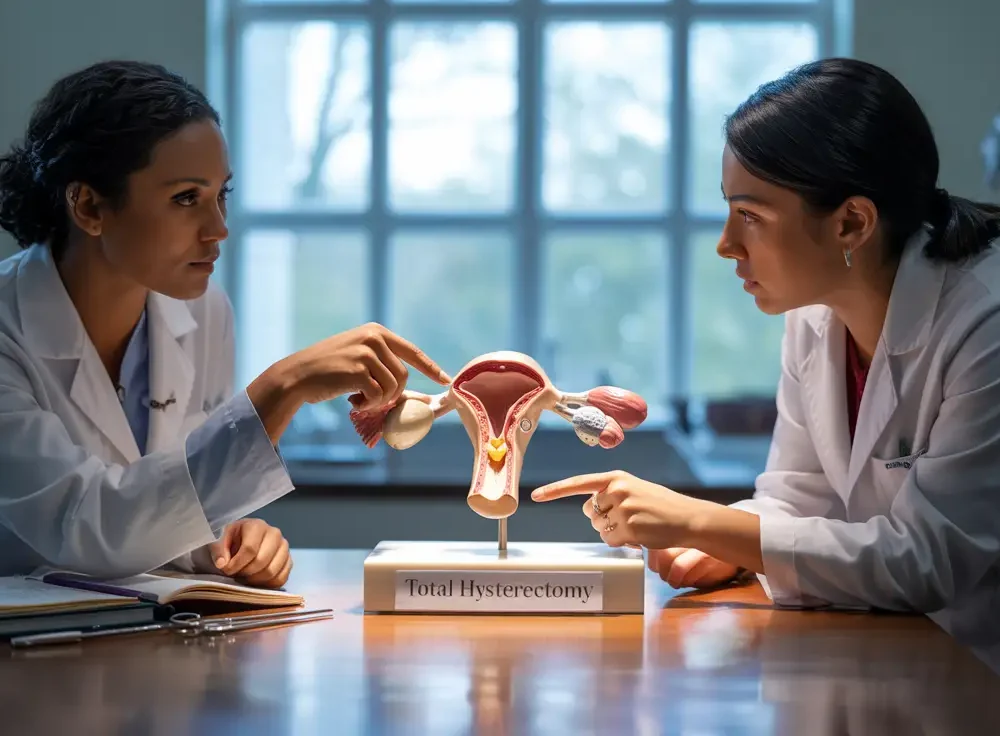
Last Updated on August 28, 2025 by Beth Skwarecki
Let’s talk about something that’s probably been keeping you up at night. You’re facing a hysterectomy, or maybe you’ve already had one, and you’re wondering: “Is this going to affect how long I live?”
It’s a totally valid concern, and honestly, I get why you’re worried. Having your uterus removed feels like a big deal – because it IS a big deal. But here’s the thing: the research might surprise you more than you think.
What Exactly is a Total Hysterectomy?
Before we jump into the longevity stuff, let’s get our terms straight. A total hysterectomy means your entire uterus and cervix get removed. Sometimes the ovaries come out too (that’s called an oophorectomy), and sometimes they don’t. This distinction is actually super important for your life expectancy – more on that in a sec.
There are different ways surgeons can do this:
- Abdominal hysterectomy: Through a larger incision in your belly
- Laparoscopic hysterectomy: Through tiny keyhole incisions (way less invasive)
- Vaginal hysterectomy: Through the vagina itself

The Real Talk on Life Expectancy
Here’s where things get interesting. Most studies show that having a hysterectomy alone doesn’t significantly impact your overall life expectancy. I know, right? After all that worry!
A massive 21-year study in Australia followed over 13,000 women and found something pretty reassuring: women who had hysterectomies (but kept their ovaries) didn’t have increased mortality risk compared to women who never had the surgery.
But wait – there’s a catch. And it’s a big one.
The Ovary Factor Changes Everything
Here’s where age and ovaries become your new best friends (or enemies). If you’re under 50 and have your ovaries removed along with your uterus, that’s when things get more complicated.
Studies consistently show that women under 50 who lose both ovaries during hysterectomy have:
- Higher cardiovascular mortality risk (we’re talking double the risk in some cases)
- Increased risk of heart disease
- Higher chance of osteoporosis
- Potential cognitive issues down the road
Why? Because your ovaries are hormone powerhouses. When they’re suddenly gone, your body goes into immediate menopause – no gradual transition, just BAM! – and that hormonal nosedive can wreak havoc.
Age Matters More Than You Think
The younger you are when you have a hysterectomy, the more it potentially affects your long-term health. Women in their 30s face higher risks than those in their 40s, who face higher risks than those over 50.
Research from Norway found that women who had total hysterectomies were twice as likely to experience cardiovascular mortality – but this was especially pronounced in younger women.
The Hormone Replacement Therapy Game-Changer
Here’s some good news though: if you do need your ovaries removed before age 50, hormone replacement therapy (HRT) can be a lifesaver – literally. That same Australian study found that women who used HRT after oophorectomy didn’t have the same increased mortality risks.
So if your doctor recommends HRT after surgery, don’t just brush it off. It could genuinely protect your long-term health.
What Actually Affects Your Life After Hysterectomy?
Beyond the mortality stats, let’s talk about what really impacts your day-to-day life and overall health:
Heart Health Takes Center Stage
Your cardiovascular system becomes priority #1. Estrogen has protective effects on your heart, so losing it suddenly means you need to be extra vigilant about:
- Blood pressure monitoring
- Cholesterol management
- Regular cardio exercise
- Heart-healthy nutrition
Bone Health Becomes Critical
Without estrogen, your bones start losing density faster. We’re talking about a significantly higher osteoporosis risk within just 7 years post-surgery.
Make friends with:
- Calcium and Vitamin D supplements
- Weight-bearing exercises (think walking, dancing, lifting weights)
- Regular bone density screenings
Mental Health Matters More
The psychological impact is real, folks. Some women experience:
- Grief over lost fertility
- Changes in sexual function
- Mood swings (thanks, hormonal changes!)
- Identity shifts
Don’t tough it out alone – counseling can be incredibly helpful.
The Bottom Line: Your Action Plan
Look, I’m not gonna sugarcoat this – a total hysterectomy, especially with ovary removal before 50, does come with some health considerations. But here’s what you can do to stack the deck in your favor:
If you’re considering surgery:
- Ask your surgeon about keeping at least one ovary if medically possible
- Explore all non-surgical alternatives first (like UFE for fibroids)
- Get a second opinion – seriously, it’s your body
If you’ve already had surgery:
- Work closely with your healthcare team on HRT decisions
- Prioritize heart-healthy lifestyle choices
- Stay on top of bone health screening
- Don’t skip your regular check-ups
- Consider joining a support group
The Most Important Thing?
Studies show that for most women over 50, hysterectomy doesn’t significantly impact life expectancy. And for younger women who need the surgery, being proactive about the hormonal changes makes a huge difference.
FAQs
Final Thoughts
Your life expectancy after a total hysterectomy isn’t set in stone – it’s largely in your hands. The key is understanding the risks, working with knowledgeable healthcare providers, and taking charge of the factors you can control.
Remember: millions of women have hysterectomies and go on to live full, healthy lives. With the right approach and support, there’s no reason you can’t be one of them 🙂

Carla specializes in writing about post-surgery recovery, pain management, and practical health tips. With a compassionate approach, Carla shares actionable strategies to ease discomfort, promote healing, and empower readers with knowledge to make recovery smoother and less stressful.